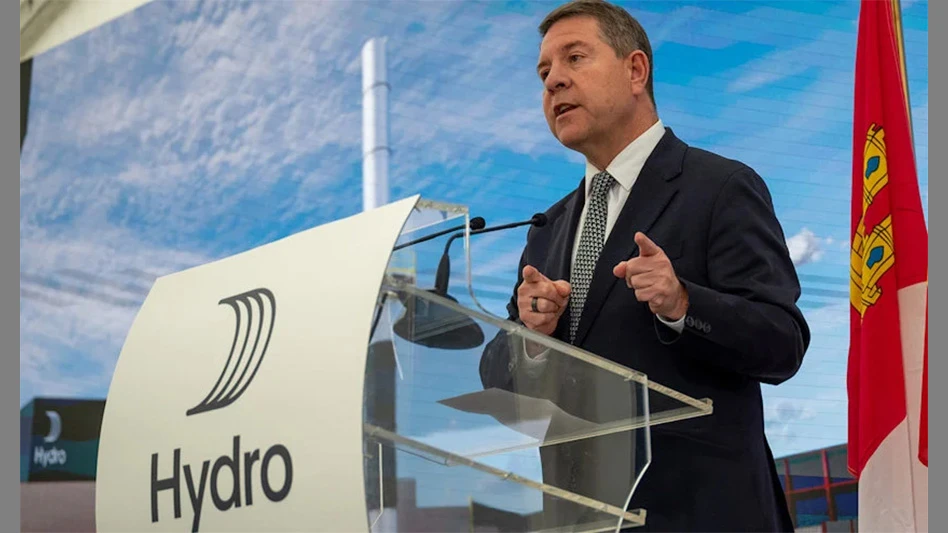 |
Many residents in the north central Wisconsin counties of Marathon and Portage are benefitting from the fact that their garbage and their recyclables are collected in a single weekly visit using the same truck.
That means fewer trucks on the road, greater safety in the neighborhoods, less fuel consumed and convenient, one-day pickups for residents, says Cory Tomczyk, president and founder of IROW, based in Mosinee, Wis.
The waste and recycling collection company, founded 21 years ago, now employs 42 people and serves residential customers in several north central Wisconsin townships, as well as commercial customers throughout the area. IROW stands for Industrial Recyclers of Wisconsin, the company’s original name, which Tomczyk has since abbreviated.
Several years back, IROW implemented a split-truck collection program in which one side-loader collection truck picks up garbage and recyclables in the same trip, compacting them in separate bins that are built into the truck.
The company’s fleet of 18 various trucks includes eight custom-designed or factory-built split-body trucks, most of which are Labrie Expert 2000 series trucks that have been modified for dual collection of residential waste and recyclables. IROW also operates four semi-tractors, two trucks for the collection of confidential documents and three roll-off trucks.
Local Investments
The townships that Tomczyk serves, located in the counties of Marathon and Portage, moved to single-stream recycling about five or six years ago, with weekly pickups. That’s when Tomczyk decided to purchase the factory-built split-body trucks as well as Labrie side loaders that could easily be modified for dual collection.
“In my view, if I can have split-body trucks collecting recyclables and garbage, I’m only emptying one fuel tank on one route, and customers like it because they don’t have to remember which day is recycling day,” Tomczyk says.
IROW’s custom-designed split-body collection trucks were refurbished, fabricated and assembled within 35 miles of IROW’s plant using metal fabricators and hydraulics shops based in Central Wisconsin. Each truck cost around $190,000, the company has reported.
“Any town that we service for collection is being serviced by a split-body truck, and we’re picking up garbage and recycling on the same day,” says Tomczyk.
The trucks feature a double-hopper system in which recyclables are placed into an outer hopper and garbage is emptied into the larger inner hopper. With a push of the button, material fed into both hoppers is compacted in separate collection chambers at the same time.
Tomczyk has used the single-route strategy for some years now, though he did try using two separate vehicles for a short period several years ago. Back then recyclables were being picked up once every two weeks, using vehicles with a series of compartments for glass, plastic, tin and paper. IROW operated a second route to collect garbage.
Tomczyk purchased all of his Labrie truck bodies either from other haulers or used truck dealers. “We refurbished them ourselves using local manufacturers,” he says. A local metals fabrication shop in the area has helped the company to rebuild any body parts that have needed to be refurbished or replaced. And a local hydraulics dealer helped with the hydraulic cylinders, he adds. The truck bodies were then painted and remounted on new truck chassis.
“Some of these bodies are 20 years old,” he says.
On its website, Labrie describes the Expert 2000 truck as a drop-frame, side loading unit that can be adapted for manual, semi-automated or fully automated refuse or recycling collection operations.
That’s just what Tomczyk has done. “They’re custom built to some degree,” he says, “but they still look like Labrie 2000 side loaders.
He says he orders replacement parts from Labrie. What he can’t order he has fabricated. “Even though these bodies are years old, we just fix up the steel, fix up the hydraulics, and you can make them run for a long time.” Some of the upgrades made to the older truck bodies include replacing worn floors, rusted panels above the wheels and dented bumpers.
“There’s nothing wrong with the trucks; the concept is still to pack garbage,” Tomczyk adds.
While a few of the trucks Tomczyk purchased were factory-built split bodies, the majority of them were modified by local metals fabricators using a split-body modification kit available from Labrie. The floating knife system mounts to the compartment’s ram, and brackets are used to divide the collection compartment into a 60/40 split for garbage and recyclables.
“Then we’ll have a metal fabricator put a wall panel down the center of the back of the truck,” Tomczyk explains. The whole area can still be compacted.
Tomczyk also has made it a point to use local contractors rather than purchase split-body vehicles from outside the area, even though that would have cost less, he says. “Instead of buying a body from somewhere else, we spend that money locally.”
Tomczyk says the garbage he collects goes to landfill, and the recyclables come to IROW before being sent to the single-stream material recovery facility operated by Pellitteri Waste Systems of Madison.
Since implementing the dual-collection scheme, Tomczyk says, recycling rates have increased. The company is continuing to grow with the addition of new contracts.
“Once we started collecting single stream, the companies that were around here had to follow suit,” he says. “That’s where the industry was heading, we just happened to be ahead of it.”
And now that IROW offers weekly collections of recyclables in the communities it serves, Tomczyk says other townships in the area that were late to the game want weekly collection too. “It’s easier and it encourages recycling,” he says.
A few nearby communities, including the nearby city of Wausau, about 17 miles to the north, still have an every-other-week collection schedule, Tomczyk says.
 IROW’s trucks feature separate compartments. Recyclables are emptied into the outer hoppers, while garbage goes into inner hoppers. |
CNG Power
Another new trucking strategy for IROW has been the use of vehicles powered by compressed natural gas (CNG). Tomczyk started that early this year, with the operation of two retrofitted Labrie 2000 trucks that are powered by CNG rather than liquid diesel.
Tomczyk concedes that understanding the costs for CNG and making this type of fuel work for a hauling company in particular can take some time. Right now, only one CNG station is open in the area, Tomczyk says, and IROW is currently the only company in the area using CNG trucks, but that is about to change. Two other CNG stations are planned to open in the Wausau area later this year, and a local supply company recently ordered 12 CNG-powered trucks.
Tomczyk says determining the true cost of CNG can be a challenge at times. While the fuel itself is cheaper than liquid diesel, the trucks get fewer miles per gas gallon equivalent: about 3.4 miles compared with 5 miles on diesel.
And Tomczyk adds, using CNG for a garbage hauling is probably one of the most difficult applications for determining costs. “Over the road is a lot easier,” he says. “The garbage truck is constantly revving its engine to pack the garbage, so your miles per gallon is different,” he says. “You’re revving the engine to power the truck, not move to it down the road.
“We’re still not seeing where we think we’ll be or where others told us we should be,” Tomczyk adds, but he says he believes more stable pricing will follow eventually as the company learns from experience.
So far, he says, “there’s been no real difference in the two for the trucks that we have set up.”
Tomczyk adds, “We will have to work through those issues because we are the first in the area to do it.”
The author is a managing editor with the Recycling Today Media Group and can be contacted at lmckenna@gie.net.
Get curated news on YOUR industry.
Enter your email to receive our newsletters.

Explore the August 2013 Issue
Check out more from this issue and find your next story to read.
Latest from Recycling Today
- Toppoint Holdings expands chassis fleet
- Lego creates miniature tire recycling market
- Lux Research webinar examines chemical recycling timetables
- Plastics producer tracks pulse of wire recycling market
- Republic Services, Blue Polymers open Indianapolis recycling complex
- Altilium produces EV battery cells using recycled materials
- Brightmark enters subsidiaries of Indiana recycling facility into Chapter 11
- Freepoint Eco-Systems receives $50M loan for plastics recycling facility





